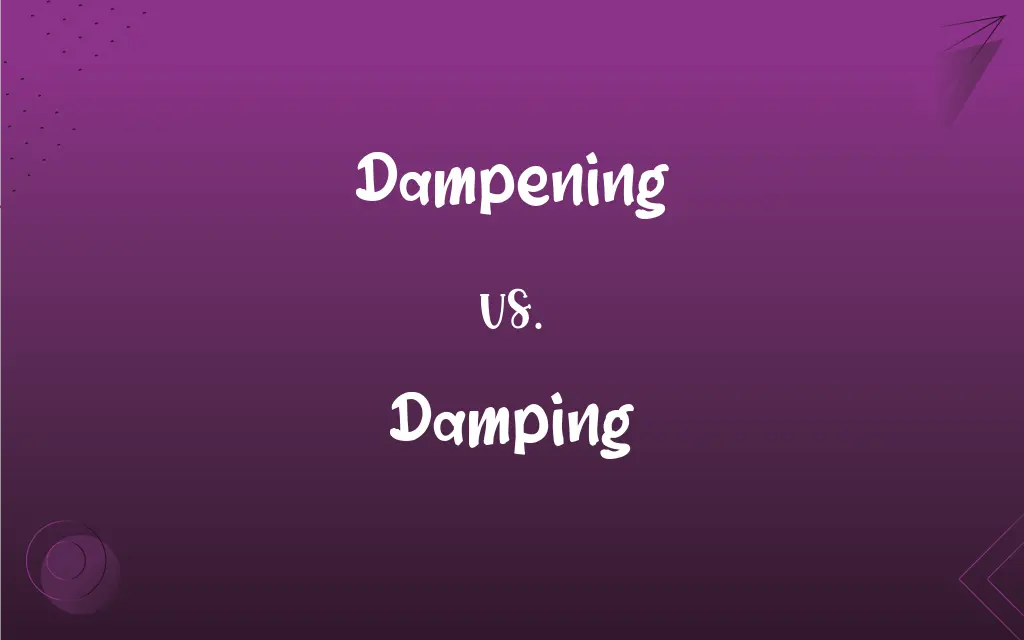Dampening vs. Damping: What's the Difference?
Edited by Aimie Carlson || By Janet White || Updated on October 5, 2023
Dampening refers to making something slightly wet, while damping involves reducing force, vibration, or intensity.

Key Differences
Dampening and Damping are terms that are sometimes used interchangeably but have distinct differences in meaning. Dampening primarily means making something slightly wet. Damping, on the other hand, relates to reducing force, vibration, or intensity.
In the world of physics, Damping is the decrease of amplitude in oscillations or waves, like in a shock absorber in a car. Dampening, in this context, would be incorrect as it doesn't align with the scientific meaning.
Everyday usage might see Dampening in contexts like, "Rain dampening a cloth." Here, it means the cloth has become slightly wet. Damping wouldn't be apt here, as the cloth's vibrations or forces aren't being reduced.
It's crucial to choose between Dampening and Damping based on context. For wetness or moisture, Dampening is correct. For reduction, especially in a technical or mechanical sense, Damping is appropriate.
Using Dampening in a technical setting or Damping in a context of wetness can lead to misunderstandings or be seen as errors. Hence, awareness of their respective definitions is essential.
ADVERTISEMENT
Comparison Chart
Primary Meaning
Making slightly wet
Reducing force, vibration, or intensity
Usage in Physics
Incorrect for describing reduction in amplitude
Used to describe decrease in oscillation amplitude
Grammar/Part of Speech
Often used as a verb
Often used as a noun or verb
Common Contexts
Wetness, moisture, rain
Mechanics, physics, reduction
Example
"The rain is dampening the ground."
"The car's damping system is state-of-the-art."
ADVERTISEMENT
Dampening and Damping Definitions
Dampening
Making slightly wet or moist.
The morning dew was dampening the grass.
Damping
Decreasing the amplitude of oscillations.
The damping mechanism in the clock ensures accuracy.
Dampening
Reducing enthusiasm or spirit.
The unexpected news had a dampening effect on the party.
Damping
Preventing unwanted oscillation in an electronic signal.
Proper damping in the circuit prevented any interference.
Dampening
Softening the impact or intensity.
The curtains were effective in dampening the outside noise.
Damping
Reducing force or intensity.
The damping of the vibrations was necessary for a smooth ride.
Dampening
Causing to be less vibrant or lively.
The gloomy weather is dampening my mood.
Damping
Lessening the volume or magnitude.
Damping the audio feedback was essential during the live concert.
Dampening
Making less sharp or clear.
The fog is dampening visibility on the road.
Damping
Diminishing energy in a mechanical system.
The damping system in the elevator ensures safety during operation.
Dampening
To make damp.
Damping
The gradual reduction of excessive oscillation, vibration, or signal intensity, and therefore of instability in a mechanical or electrical device, by a substance or some aspect of the device.
Dampening
To deaden, restrain, or depress
"trade moves ... aimed at dampening protectionist pressures in Congress" (Christian Science Monitor).
Damping
Present participle of damp
Dampening
To soundproof.
Damping
(mechanics) The reduction in the magnitude of oscillations by the dissipation of energy
Dampening
To become damp.
Damping
(mechanics) The stabilization of a physical system by reducing oscillation
Dampening
Present participle of dampen
Dampening
The act of making or becoming damp.
Dampening
The act or process of making something slightly wet.
Dampening
The act of making something slightly wet
FAQs
What does "Dampening" primarily mean?
"Dampening" primarily refers to making something slightly wet or moist.
Is it correct to say "Dampening of vibrations"?
It's more accurate to say "Damping of vibrations," as it refers to the reduction of force or amplitude.
Is "Damping" related to wetness?
No, "Damping" refers to reducing force, vibration, or intensity.
What context is "Damping" most often used in?
"Damping" is often used in mechanics and physics, especially when referring to reduction in amplitude.
Can "Dampening" relate to reducing enthusiasm?
Yes, in contexts like "a dampening effect on spirits," it means reducing enthusiasm or spirit.
Can "Damping" refer to sound reduction?
Yes, "Damping" can refer to reducing the volume or intensity of sound.
What's the opposite of "Dampening"?
The opposite could be "drying" or "invigorating," depending on the context.
Is it a mistake to use "Dampening" in a mechanical context?
Generally, "Damping" is the appropriate term in mechanical contexts, so using "Dampening" might be seen as an error.
Is "Dampening" used in scientific contexts?
"Damping" is the preferred term in most scientific contexts, especially in physics.
How can I remember the difference between the two?
Think of "Dampening" as related to "damp" (wet) and "Damping" as reducing something's force or intensity.
How is "Damping" used in electronics?
In electronics, "Damping" can refer to preventing unwanted oscillations in a signal.
Can "Dampening" be used as a noun?
While "Dampening" is primarily a verb, it can be used as a noun, like "the dampening of my spirits."
Are "Dampening" and "Damping" interchangeable?
No, they have distinct meanings. "Dampening" is about wetness or reducing enthusiasm, while "Damping" is about reducing force or intensity.
How do dictionaries define "Dampening"?
Dictionaries often define "Dampening" as making something slightly wet or reducing enthusiasm.
Are these words often confused in usage?
Yes, "Dampening" and "Damping" are sometimes used interchangeably, but it's important to use them correctly based on context.
Which term is older, "Dampening" or "Damping"?
Both terms have old origins, but their current usages and distinctions have evolved over time.
Can "Dampening" refer to emotions?
Yes, "Dampening" can mean reducing or suppressing emotions or enthusiasm.
Can a system have "Damping"?
Yes, systems, especially mechanical or electronic, can have "Damping" to reduce unwanted oscillations or forces.
Can I say "The dampening of the cloth"?
Yes, it means that the cloth is becoming slightly wet.
Can weather have a "Damping" effect?
While weather can have a "Dampening" effect on spirits or moods, it's not described as having a "Damping" effect.
About Author
Written by
Janet WhiteJanet White has been an esteemed writer and blogger for Difference Wiki. Holding a Master's degree in Science and Medical Journalism from the prestigious Boston University, she has consistently demonstrated her expertise and passion for her field. When she's not immersed in her work, Janet relishes her time exercising, delving into a good book, and cherishing moments with friends and family.
Edited by
Aimie CarlsonAimie Carlson, holding a master's degree in English literature, is a fervent English language enthusiast. She lends her writing talents to Difference Wiki, a prominent website that specializes in comparisons, offering readers insightful analyses that both captivate and inform.































































